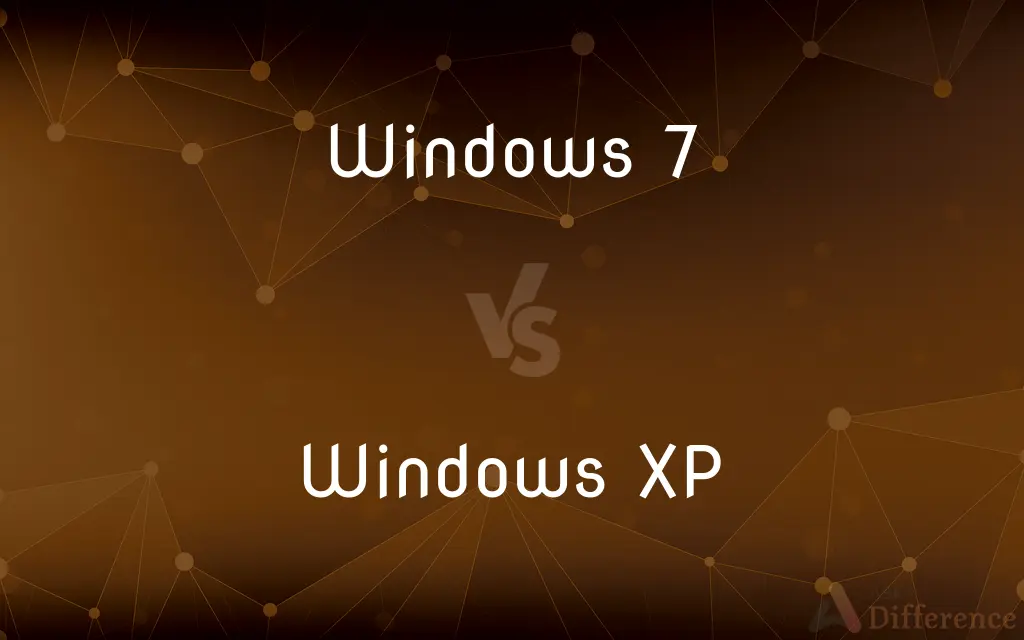Windows 7 vs. Windows XP — What's the Difference?
By Tayyaba Rehman — Published on November 5, 2023
Windows 7 and Windows XP are both Microsoft operating systems, with Windows 7 being a newer release.

Difference Between Windows 7 and Windows XP
Table of Contents
ADVERTISEMENT
Key Differences
Windows 7 and Windows XP are operating systems developed by Microsoft. While both systems have been popular choices among users, they were released nearly a decade apart, with Windows XP debuting in 2001 and Windows 7 in 2009.
Windows 7 was designed to address many criticisms faced by Windows XP, especially concerning security. While Windows XP had vulnerabilities that made it susceptible to malware and viruses, Windows 7 came with enhanced security features and a more advanced firewall.
When it comes to user interface, Windows 7 introduced several new features and improvements over Windows XP. This includes the redesigned taskbar, Aero Peek, and Aero Snap which enhanced multitasking and window management.
The hardware requirements for Windows 7 are more demanding than those for Windows XP. Windows XP could run on older hardware, but Windows 7 necessitated more modern and powerful hardware to function optimally.
Finally, Windows 7 brought better compatibility and support for newer applications and devices compared to Windows XP, ensuring users could utilize the latest technology with ease.
ADVERTISEMENT
Comparison Chart
Release Date
2009
2001
Security
Enhanced security features
Vulnerable to certain threats
User Interface
Introduced Aero Peek, Aero Snap
Lacked these features
Hardware Requirements
Demanding; requires modern hardware
Less demanding; runs on older PCs
Software Compatibility
Better support for modern applications
Might not support newer software
Compare with Definitions
Windows 7
Windows 7 has an improved taskbar over its predecessors.
I love pinning my favorite apps to the Windows 7 taskbar.
Windows XP
Windows XP is a Microsoft operating system launched in 2001.
My first computer ran on Windows XP.
Windows 7
Windows 7 offers enhanced security features compared to earlier versions.
With Windows 7, I felt more secure browsing the internet.
Windows XP
Windows XP introduced the "Luna" visual style.
I loved the blue theme of Windows XP called Luna.
Windows 7
Windows 7 is a Microsoft operating system released in 2009.
I upgraded my computer to Windows 7 for a more modern experience.
Windows XP
Windows XP had a unique feature called "System Restore" that allowed users to revert their PCs to a previous state.
When my software installation went wrong, I used Windows XP's System Restore to fix it.
Windows 7
Windows 7 provides better support for touch, speech, and handwriting recognition.
Using a touchscreen is so intuitive on Windows 7.
Windows XP
Windows XP was known for its classic start menu and user-friendly interface.
Navigating through my programs in Windows XP was always straightforward.
Windows 7
Windows 7 introduced the Aero interface with enhanced visual effects.
The transparent windows in Windows 7 added a touch of sophistication to my desktop.
Windows XP
Windows XP was lighter on system resources compared to newer versions.
Older PCs performed well with Windows XP due to its minimalistic requirements.
Common Curiosities
What are Windows 7 and Windows XP?
Both are Microsoft operating systems, with Windows 7 being a newer release than Windows XP.
Is Windows 7 more secure than Windows XP?
Yes, Windows 7 introduced enhanced security features addressing many vulnerabilities found in Windows XP.
Is Windows 7 interface different from Windows XP?
Yes, Windows 7 introduced the Aero interface with advanced visual effects, unlike Windows XP.
Why was Windows XP popular among businesses?
Windows XP was stable, user-friendly, and required fewer hardware resources, making it a top choice for businesses.
Which operating system is more resource-intensive, Windows 7 or Windows XP?
Windows 7 is more demanding and requires more system resources than Windows XP.
When were Windows 7 and Windows XP released?
Windows XP was released in 2001, while Windows 7 was released in 2009.
Can I upgrade directly from Windows XP to Windows 7?
A direct upgrade isn't supported; you'll need a clean install when moving from Windows XP to Windows 7.
Can Windows 7 run on the same hardware as Windows XP?
Not necessarily; Windows 7 generally requires more modern hardware compared to Windows XP.
Which one has better software compatibility, Windows 7 or Windows XP?
Windows 7 provides better support for newer applications compared to Windows XP.
Are there any visual styles unique to Windows XP?
Yes, Windows XP introduced the "Luna" visual style.
Do both Windows 7 and Windows XP support touch features?
Windows 7 has enhanced support for touch features, while Windows XP lacks comprehensive touch functionality.
Can I still use Windows XP or Windows 7 after end of support?
While possible, it's risky as there will be no security updates, making your PC vulnerable.
When did Microsoft end support for Windows XP and Windows 7?
Support for Windows XP ended in 2014, while for Windows 7, it ended in 2020.
Are there any features in Windows XP not found in Windows 7?
Most features in Windows XP were carried over or improved upon in Windows 7, though certain aspects of the interface, like the classic start menu, differ.
Did Windows 7 introduce any new multitasking features over Windows XP?
Yes, Windows 7 introduced Aero Peek and Aero Snap to improve multitasking.
Share Your Discovery

Previous Comparison
Electric Field vs. Electric Potential
Next Comparison
Attribute vs. ParameterAuthor Spotlight
Written by
Tayyaba RehmanTayyaba Rehman is a distinguished writer, currently serving as a primary contributor to askdifference.com. As a researcher in semantics and etymology, Tayyaba's passion for the complexity of languages and their distinctions has found a perfect home on the platform. Tayyaba delves into the intricacies of language, distinguishing between commonly confused words and phrases, thereby providing clarity for readers worldwide.













































